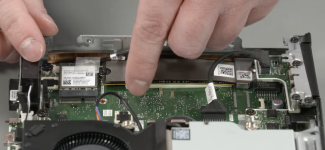Hi all,

Today I picked up an HP 400 Mini G9 with an Intel i5-12500T and 32GB RAM for my homelab. I’m migrating from an HP MicroServer Gen8 (ESXi), and since I’m not too strong on hardware planning, I’d appreciate advice on the storage layout.
The machine has three built-in storage options:
For the main M.2 slot, I’m planning to use a 2TB Transcend TS2TMTE712A (~120€). Seller advertises it as industrial grade (4000 TBW), so seems decent for VM workloads.
Would it be OK to store light backups / non-critical data on the same SATA disk alongside the PVE installation?
Given:
Thanks!
Adrian

Today I picked up an HP 400 Mini G9 with an Intel i5-12500T and 32GB RAM for my homelab. I’m migrating from an HP MicroServer Gen8 (ESXi), and since I’m not too strong on hardware planning, I’d appreciate advice on the storage layout.
The machine has three built-in storage options:
- M.2 2280
- 2.5" SATA bay (SATA 600)
- M.2 2230 (currently occupied by Wi-Fi module)
- External USB-C USB 3.2 Gen 2x2
For the main M.2 slot, I’m planning to use a 2TB Transcend TS2TMTE712A (~120€). Seller advertises it as industrial grade (4000 TBW), so seems decent for VM workloads.
My use case
- Server will only run VMs/containers
- Separate NAS already exists for media/document storage
- Just looking for the optimal layout for Proxmox + VM disks
Options I'm considering
A:
- Install Proxmox on the 2.5" SATA SSD
- Use the 2TB NVMe (M.2 2280) for VM storage
Would it be OK to store light backups / non-critical data on the same SATA disk alongside the PVE installation?
B:
- Install Proxmox on an external USB 3.2 Gen 2x2 drive (20 Gbps)
- Create a ZFS pool using SATA + NVMe
Filesystem dilemma
I know this one is debated everywhereGiven:
- No power-loss-protected SSDs
- 32GB RAM (not huge for ZFS + ARC)
- Mostly VM storage, not a fileserver workload
- use EXT4 for Proxmox system disk?
- and ZFS for the VM storage NVMe?
Even if it will be a single-drive ZFS pool?
Thanks!
Adrian

